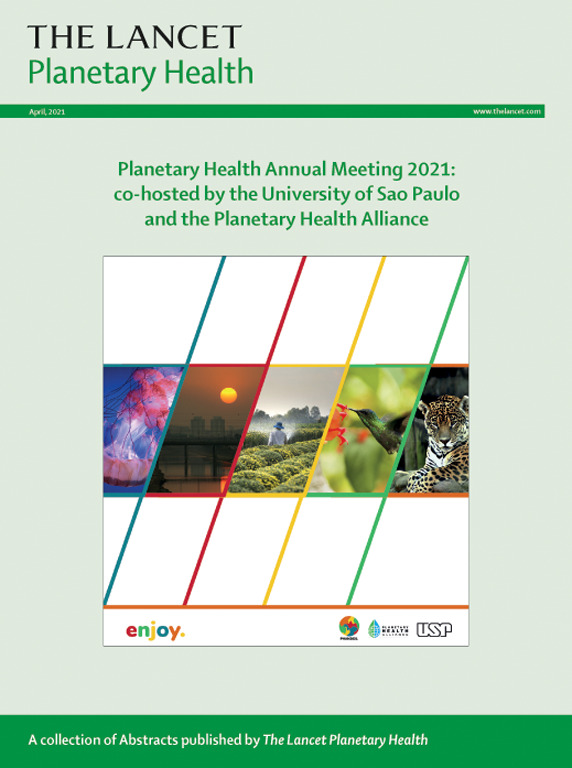The environment in global health governance: an analysis of environment-related resolutions adopted at the World Health Assembly from 1948 to 2023
IF 24.1
1区 医学
Q1 ENVIRONMENTAL SCIENCES
引用次数: 0
Abstract
Background
The concept of planetary health underscores the intricate relationship between environmental concerns and global health. This interconnection raises an important question related to cross-sectoral policy development: to what extent are environmental issues integrated into global health governance? To address this question, this study examines resolutions adopted by the World Health Assembly (WHA) from 1948 to 2023.
Methods
Based on a systematic text search for environmental issues, this study examines the evolution of the occurrence and content of resolutions adopted by the WHA and the structure and pattern of connectivity of the normative network of resolutions regarding environment-related resolutions from 1948 to 2023. Environment-related resolutions were processed in the Python environment using relevant packages, such as Pandas, Numpy, and Matplotlib. Regular expressions were employed to identify citations among resolutions and construct a directed citation network. The network was then examined using NetworkX and Graph-Tool.
Findings
Despite important variations in the attention dedicated to environmental issues in resolutions adopted by the WHA, the proportion of environment-related resolutions adopted each year has increased. The number of topics and their diversity have also expanded. Although environment-specific resolutions are well connected to each other, they are more weakly connected to environment-related resolutions, and not well connected to non-environment-related resolutions, suggesting potential silos in policy development. This study shows that several topical entry points exist for a deeper integration of environmental concerns in global health governance.
Interpretation
The findings of this study indicate not only the growing reference to environmental concerns in global health governance, but also an evolution of the understanding of the environment as a key driver of the health of the people. However, there remains room for more comprehensive integration across all areas of global health policy. The study emphasises both the need for active participation in global environmental governance processes that affect health and the importance of minimising the health sector's contribution to environmental problems.
Funding
None.
全球卫生治理中的环境:分析1948年至2023年世界卫生大会通过的与环境有关的决议
背景地球健康的概念强调了环境问题与全球健康之间错综复杂的关系。这种相互联系提出了一个与跨部门政策制定相关的重要问题:环境问题在多大程度上被纳入了全球卫生治理?为了解决这个问题,本研究对世界卫生大会(WHA)从 1948 年到 2023 年通过的决议进行了研究。方法基于对环境问题的系统文本检索,本研究对世界卫生大会通过的决议的出现和内容的演变,以及 1948 年到 2023 年与环境相关决议的规范性网络的结构和连接模式进行了研究。在 Python 环境中使用 Pandas、Numpy 和 Matplotlib 等相关软件包处理了与环境相关的决议。使用正则表达式识别决议之间的引文,并构建有向引文网络。尽管世界卫生大会通过的决议对环境问题的关注度存在重大差异,但每年通过的与环境相关的决议所占比例都在增加。议题的数量和多样性也有所扩大。尽管针对环境问题的决议之间联系紧密,但它们与环境相关决议之间的联系较弱,与非环境相关决议之间的联系也不紧密,这表明在政策制定过程中可能会出现 "孤岛 "现象。本研究表明,有几个专题切入点可以将环境问题更深入地纳入全球卫生治理中。 本研究的结果表明,不仅全球卫生治理中越来越多地提及环境问题,而且人们对环境作为人类健康主要驱动力的认识也在不断发展。然而,在全球卫生政策的所有领域,仍有更全面整合的余地。本研究既强调了积极参与影响健康的全球环境治理进程的必要性,也强调了将卫生部门对环境问题的影响降至最低的重要性。
本文章由计算机程序翻译,如有差异,请以英文原文为准。
求助全文
约1分钟内获得全文
求助全文
来源期刊

Lancet Planetary Health
Multiple-
CiteScore
28.40
自引率
2.30%
发文量
272
审稿时长
8 weeks
期刊介绍:
The Lancet Planetary Health is a gold Open Access journal dedicated to investigating and addressing the multifaceted determinants of healthy human civilizations and their impact on natural systems. Positioned as a key player in sustainable development, the journal covers a broad, interdisciplinary scope, encompassing areas such as poverty, nutrition, gender equity, water and sanitation, energy, economic growth, industrialization, inequality, urbanization, human consumption and production, climate change, ocean health, land use, peace, and justice.
With a commitment to publishing high-quality research, comment, and correspondence, it aims to be the leading journal for sustainable development in the face of unprecedented dangers and threats.
 求助内容:
求助内容: 应助结果提醒方式:
应助结果提醒方式:


